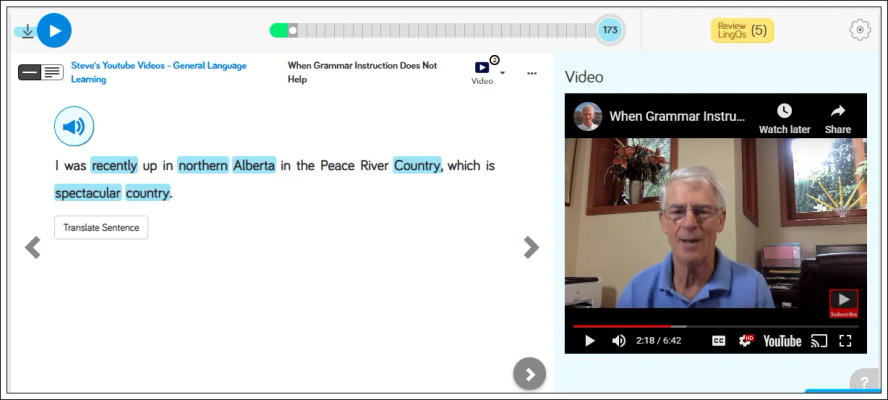Today, I want to talk briefly about grammar and about my recent trip to Peace River. I was recently up in northern Alberta in the Peace River Country, which is spectacular country. There are great fields of wheat and canola, which is rapeseed, forests, there’s oil, not so many people, but very friendly people. A rougher, sort of different lifestyle to what we have here in Vancouver. I fly to Edmonton and from Edmonton take another flight to Grand Prairie and then drive two and a half hours north.
The reason I mention it is because while on my plane — actually, we were flying from Grand Prairie to Edmonton – there was a passenger who spoke only French and he was asking his neighbor, a lady who was, basically, an English speaker. He was a young fellow and probably not a very experienced traveler and he was trying to find out what happens to his luggage and so this lady was trying to explain in her high school French. She did quite well, compared to the level of most English-speaking Canadians. What struck me was here was this woman who had quite a few words, but all her verbs were in the infinitive, you know, vous… prendre… bagage… penser… (you… take… luggage… think…), whatever.
I have noticed, often, that graduates of the English school system who learn French or Spanish, all they really remember are the words. Despite the emphasis on grammar, in particular in French, obviously in all Latin languages, the tenses are a problem. Depending on person and number, you know, I, you, we, go, did go, went, everything changes and in English we’re not used to that. So there’s a lot of emphasis, I remember from my high school days and I know it hasn’t changed. A lot of emphasis on the tenses and yet, overwhelmingly, people graduate and they speak in the infinitive because teaching people about grammar doesn’t enable them to produce it correctly; rather, lots of exposure does.
Now, granted, English may be easier insofar as tenses are concerned, maybe not, but Swedish kids who watch a lot of English-language television speak much better English than English-speaking kids in Canada who go through French in school. So being taught grammar doesn’t mean that you can produce it correctly; rather, and I keep harping on this, lots of exposure, lots of listening, lots of reading, eventually speaking, making mistakes, picking up on your mistakes, listening some more.
Gradually, that’s going to ingrain these habits because for a speaker of a language which is not inflected very much like English, it’s a difficult habit to get into. Even though you may know, theoretically, je vais, tu vas, il va, nous allons, vous allez, ils vont… (I go, you go, he goes, we go, you go, they will…), when you go to speak the brain doesn’t want to do it because it’s not used to doing it until you’ve had enough exposure. So I just wanted to make that point.
It’s going to be a short one today and I’m going to end up with a few shots from my iPhone. First, you’ll see some of the fields. I think these are canola fields, a bumper crop up there in the Peace River. Then I went, of course, to visit our saw mill up there and the mill manager Riall and his wife Kim took us on the Peace River. It’s fairly far north, I mean there’s not very many people. Normally we stay at Riall’s place in the Town of Manning, which is about a thousand people in the town, lots of farms in the area. The next town, significant town, is probably 100 kilometers away.
Anyway, we went up the river a ways to a little kind of cabin he has, no running water, no electricity. We sat there and we cooked up some steaks and drank some wine. We got extra protein from the flies that were in our wine. Again, it was like 30 degrees Celsius, whatever that is in Fahrenheit, during the day, sunny and very warm. At around 7:00 in the morning as we were on the river heading back to Manning, it was 6 degrees Celsius. That’s how big the difference is.
So I will end up then with these videos. Thank you for listening, bye for now.
Access this post’s audio and transcript on LingQ.








1 comments on “Focusing on Grammar for Writing and Speaking Doesn’t Help”
Comments are closed.
I understand there are various way to learn a language and people have preferences, but I truly don’t understand problems with grammar.
My first foreign language was Spanish (LA), so the grammar was relatively simple, except for those verbs. 😉 Russian was my next, which I studied at DLI. They use a rather immersive method addressing speaking, listening, writing, reading, and grammar simultaneously. It may be the whole combination that did it, but the cases and verb forms came easily to me. It may also be my math/science mindset that plugged into it. Ironically, the Russian numbers (and Irish numbers) still give me problems.